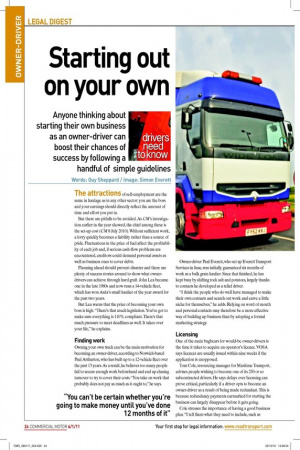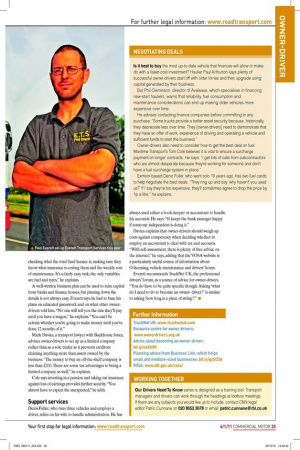Starting out on your own
Page 20

Page 21

If you've noticed an error in this article please click here to report it so we can fix it.
Anyone thinking about starting their own business as an owner-driver can boost their chances of success by following a handful of simple guidelines
Words: Guy Sheppard / Image: Simon Everett The attractions of self-employment are the same in haulage as in any other sector: you are the boss and your earnings should directly relect the amount of time and effort you put in.
But there are pitfalls to be avoided. As CM’s investigation earlier in the year showed, the chief among these is the set-up cost (CM 8 July 2010). Without suficient work, a lorry quickly becomes a liability rather than a source of pride. Fluctuations in the price of fuel affect the proitability of each job and, if serious cash-low problems are encountered, creditors could demand personal assets as well as business ones to cover debts.
Planning ahead should prevent disaster and there are plenty of success stories around to show what ownerdrivers can achieve through hard graft. John Lea became one in the late 1980s and now runs a 14-vehicle leet, which has won Asda’s small haulier of the year award for the past two years.
But Lea warns that the price of becoming your own boss is high. “There’s that much legislation. You’ve got to make sure everything is 110% compliant. There’s that much pressure to meet deadlines as well. It takes over your life,” he explains.
Finding work
Owning your own truck can be the main motivation for becoming an owner-driver, according to Norwich-based Paul Arthurton, who has built up to a 12-vehicle leet over the past 13 years. As a result, he believes too many people fail to secure enough work beforehand and end up chasing turnover to try to cover their costs. “You take on work that probably does not pay as much as it ought to,” he says. Owner-driver Paul Everett, who set up Everett Transport Services in June, was initially guaranteed six months of work as a bulk grain haulier. Since that inished, he has kept busy by shifting rock salt and potatoes, largely thanks to contacts he developed as a relief driver.
“I think the people who do well have managed to make their own contacts and search out work and carve a little niche for themselves,” he adds. Relying on word of mouth and personal contacts may therefore be a more effective way of building up business than by adopting a formal marketing strategy.
Licensing
One of the main bugbears for would-be owner-drivers is the time it takes to acquire an operator’s licence. VOSA says licences are usually issued within nine weeks if the application is unopposed.
Tom Cole, resourcing manager for Maritime Transport, advises people wishing to become one of its 250 or so subcontracted drivers. He says delays over licensing can prove critical, particularly if a driver opts to become an owner-driver as a result of being made redundant. This is because redundancy payments earmarked for starting the business can largely disappear before it gets going.
Cole stresses the importance of having a good business plan. “I tell them what they need to include, such as checking what the road fund licence is, making sure they know what insurance is costing them and the weekly cost of maintenance. It’s a fairly easy task; the only variables are fuel and tyres,” he explains.
A well-written business plan can be used to raise capital from banks and inance houses, but pinning down the details is not always easy. Everett says he had to base his plans on educated guesswork and on what other ownerdrivers told him. “No one will tell you the rate they’ll pay until you have a wagon,” he explains. “You can’t be certain whether you’re going to make money until you’ve done 12 months of it.” Mark Davies, a transport lawyer with Backhouse Jones, advises owner-drivers to set up as a limited company rather than as a sole trader as it prevents creditors claiming anything more than assets owned by the business. “The money to buy an off-the-shelf company is less than £200. There are some tax advantages to being a limited company as well,” he explains.
Cole says investing in a pension and taking out insurance against loss of earnings provides further security. “You almost have to expect the unexpected,” he adds.
Support services
Denis Fuller, who runs three vehicles and employs a driver, relies on his wife to handle administration. He has always used either a book-keeper or accountant to handle his accounts. He says: “It keeps the bank manager happy if someone independent is doing it.” Davies explains that owner-drivers should weigh up costs against competency when deciding whether to employ an accountant to deal with tax and accounts. “With self-assessment, there is plenty of free advice on the internet,” he says, adding that the VOSA website is a particularly useful source of information about O-licensing, vehicle maintenance and drivers’ hours.
Everett recommends TruckNet UK, the professional drivers’ forum, as a source of advice for owner-drivers. “You do have to be quite speciic though. Asking ‘what do I need to do to become an ownerdriver?’ is similar to asking ‘how long is a piece of string?’.” ■














































